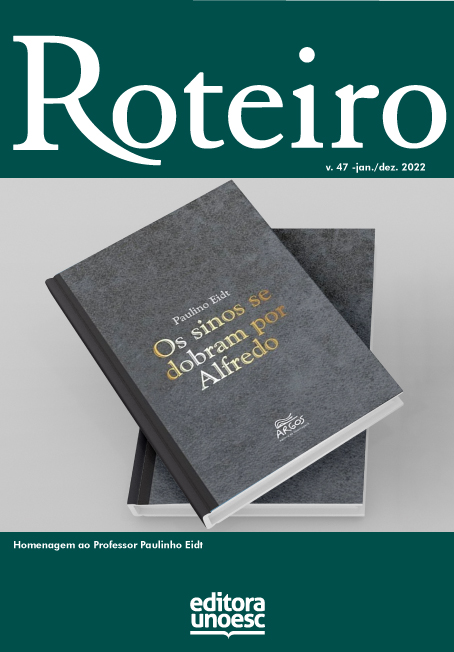Democratic management and its new fections in the Brazilian historical tour
DOI:
https://doi.org/10.18593/r.v47.23832Keywords:
democratic management, educational legislation, managerialism, neoliberalismAbstract
This article deals with the changes brought about by the legal systems, with regard to the principle of democratic management, throughout the Brazilian historical process. It discusses how educational legislation in this country accommodated new ideals, influenced by neoliberal policies for the internationalization of capital. The text presents an analysis of how the legal provisions of education have adapted to the political and social situation, proving to be vulnerable to the interests of economic groups. The general objective is to present the setbacks of democratic management by associating itself with neoliberal foundations, deconstructing the meaning attributed to the constitutional principle. It specifically intends to (i) demonstrate how Brazilian educational legislation incorporated neoliberal elements, and (ii) analyze the political orientation that directed the new insertions in the law. The study was based on the development of bibliographic research and document analysis. It concludes that the municipalities, states and the Federal District as autonomous units of the federation (although they need articulation for the effectiveness of the national education system) reproduce the neo-liberal ideals apparent in the school's management management model, obscuring participatory and control practices as an expression of democratic management, as a constitutional principle.
Downloads
References
ADRIÃO, T.; CAMARGO, R. B. A gestão democrática na Constituição Federal de 1988. In: Oliveira, R. P.; ADRIÃO, T. (org.) Gestão Financiamento e Direito à Educação: análise da LDB e da Constituição Federal. São Paulo: Xamã, 2001.
ARAUJO, S.; CASTRO, A. M. D. A. Gestão educativa gerencial: superação do modelo burocrático? Ensaio, v. 19, p. 81-106, 2011. DOI: https://doi.org/10.1590/S0104-40362011000100006
BRASIL. Constituição. República Federativa do Brasil de 1988. Brasília, DF: Senado Federal, 5 out. 1988. Disponível em: http://www.planalto.gov.br/ccivil_03/constituicao/constituicaocompilado.htm. Acesso em: 12 fev. 2021.
BRASIL. Lei n. 9.394, de 20 de dezembro de 1996. Lei de Diretrizes e Bases da Educação Nacional. Diário Oficial da União, Brasília, DF, 21 dez. 1996. Disponível em: http://www.planalto.gov.br/ccivil_03/LEIS/L9394.htm. Acesso em: 5 fev. 2020.
BRASIL. Lei n. 10.172, de 9 de janeiro de 2001. Aprova o Plano Nacional de Educação e dá outras providências. Diário Oficial da União, Brasília, DF, 10 jan. 2001. Disponível em: http://legis.senado.leg.br/norma/552048/publicacao/15716520. Acesso em: 5 fev. 2020.
BRASIL. Lei n. 13.005, de 25 de junho de 2014. Aprovou o Plano Nacional de Educação – PNE, 2014. Diário Oficial da União, Brasília, DF, 26 jun. 2014. Disponível em: http://www.planalto.gov.br/ccivil_03/_ato2011-2014/2014/lei/l13005.htm. Acesso em: 5 fev. 2020.
BRASIL. Ministério da Administração e Reforma do Estado. Plano Diretor da Reforma do Aparelho do Estado. Brasília: MARE, 1995. Disponível em: http://www.bresserpereira.org.br/documents/mare/planodiretor/planodiretor.pdf. Acesso em: 12 fev. 2021.
BRASIL. Ministério da Educação. Documento final [da CONAE 2010]. Brasília, DF: MEC, 2010. Disponível em: http://conae.mec.gov.br/images/stories/pdf/pdf/documetos/documento_final_sl.pdf. Acesso em: 3 out. 2019.
CABRAL NETO, A.; CASTRO, A. M. D. A. Gestão educacional na América Latina: delineamentos e desafios para os sistemas de ensino. In: EYNG, A. M.; GISI, M. L. (org.). Política e gestão da educação superior: desafios e perspectivas. Ijui: Unijui, 2007.
FREITAS, L. C. Escolas aprisionadas em uma democracia aprisionada: anotações para uma resistência propositiva. HISTEDBR On-line, v. 18, n. 4(78), p. 906-926, out./dez. 2018. DOI: https://doi.org/10.20396/rho.v18i4.8654333
FRIGOTTO, G. A produtividade da escola improdutiva 30 anos depois: regressão social e hegemonia às avessas. Revista Trabalho Necessário, v. 3, n. 20, 2015. Disponível em: http://periodicos.uff.br/trabalhonecessario/article/view/8619. Acesso em: 29 jun. 2021.
GIDDENS, A. A terceira via: reflexões sobre o impasse político atual e o futuro da social-democracia. Rio de Janeiro: Record, 2001.
LINO, L. A.; MORGAN, K. V. Do documento final da CONAE ao Plano Nacional de Educação: uma análise da meta 19. RPGE – Revista on line de Política e Gestão Educacional, v. 22, n. esp. 1, p. 67-83, mar. 2018. DOI: https://doi.org/10.22633/rpge.v22.nesp1.2018.10784
MARTINS, A. S. A direita para para o social: a educação da sociabilidade no Brasil contemporâneo. Juiz de Fora: UFJF, 2009.
OLIVEIRA, C.; LOPES, V. V. Autonomia, gestão escolar e órgãos colegiados: a produção de artigos em periódicos científicos (2000-2008). RBPAE, v. 26, n. 3, p. 461-476, set./dez. 2010. Disponível em: https://seer.ufrgs.br/rbpae/article/download/19793/11531. Acesso em: 10 fev. 2020.
OLIVEIRA, M. M. Como fazer pesquisa qualitativa. Petrópolis: Vozes, 2007.
PARO, V. H. Administração escolar: introdução crítica. São Paulo: Cortez, 1987.
PARO, V. H. Escritos sobre educação. São Paulo: Xamã, 2001.
PARO, V. H. Gestão democrática da escola pública. São Paulo: Ática, 1997.
PERONI, V. M. V.; FLORES, M. L. R. Sistema nacional, plano nacional e gestão democrática da educação no Brasil: articulações e tensões. Revista Educação, v. 37, p. 180-189, 2014. DOI: https://doi.org/10.15448/1981-2582.2014.2.16342
ROBERTSON, S.; DALE, R. Toward a critical cultural political economy of the globalisation of education. Globalisation, Societies and Education, v. 13, n. 1, p. 149-170, 2015. Disponível em: https://susanleerobertson.files.wordpress.com/2009/10/robertson-and-dale-2015-critical-cultural-political-economy-education.pdf. Acesso em: 4 nov. 2019. DOI: https://doi.org/10.1080/14767724.2014.967502
RUIZ, M. J. F.; MARINHEIRO, E. L. A democratização da escola pública: velhos e novos modelos de gestão escolar. Revista Educação, 2015. Disponível em: https://periodicos.ufsm.br/reveducacao/article/view/17236. Acesso em: 25 fev. 2020. DOI: https://doi.org/10.5902/1984644417236
RUIZ, M. J. F. Trabalho coletivo na escola pública: contribuições pedagógicas de Anton Semionovitch Makarenko. Org & Demo, v. 9, n. 1/2, p. 223-240, jan./dez. 2008. Disponível em: http://www2.marilia.unesp.br/revistas/index.php/orgdemo/article/view/62/68. Acesso em: 25 fev. 2020. DOI: https://doi.org/10.36311/1519-0110.2008.v9n1/2.62
SILVA, K. V. A. Plano de Desenvolvimento da Escola - PDE escola: limites e possibilidades. 2011. 139 f. Dissertação (Mestrado em Educação) – Universidade Federal da Paraíba, Paraíba, 2011. Disponível em:
http://tede.biblioteca.ufpb.br/bitstream/tede/4622/1/arquivototal.pdf. Acesso em: 23
abr. 2021.
VALENTE, I.; ROMANO, R. PNE: plano nacional de educação ou carta de intenção? Educação e Sociedade, v. 23, n. 80, p. 96-107, set. 2002. Disponível em: http://www.scielo.br/scielo.php?pid=S0101-73302002008000007&script=sci_abstract&tlng=pt. Acesso em: 25 jan. 2020. DOI: https://doi.org/10.1590/S0101-73302002008000007
Published
How to Cite
Issue
Section
License
Copyright (c) 2021 Viviane Barbosa Perez Aguiar, Maria José Ferreira Ruiz, Edwylson de Lima Marinheiro

This work is licensed under a Creative Commons Attribution 4.0 International License.
Copyright Notice
The authors retain copyright and grant the Journal the right of first publication, with the work simultaneously licensed under a Creative Commons – Attribution – 4.0 International license.












